
All SEOs and marketers know the importance of advanced Google search operators. For the uninitiated, they are special commands that you type into the Google search box to broaden the scope of regular text searches.
The most common example of a Google search operator is the "site:" search operator, which essentially displays search results from a specified site.
For instance, if I were to enter "site:99signals.com" on Google, the search engine result pages (SERPs) will only display pages from my site. Like this:
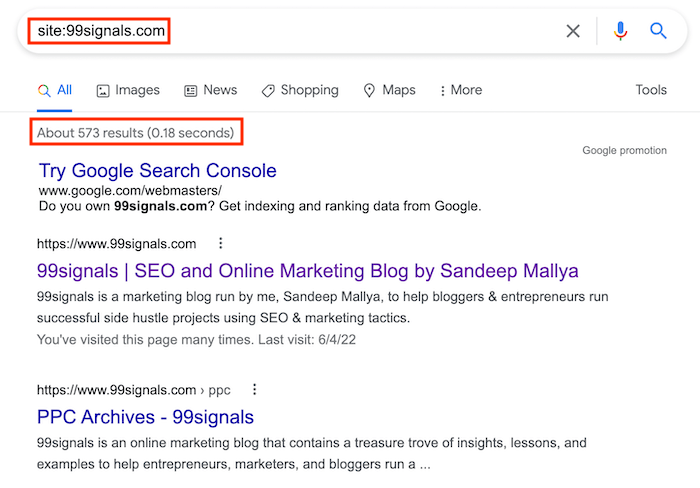
Knowing all the essential Google search operators can level up your SEO skills and help you uncover content and SEO opportunities that you may have missed otherwise.
In this article, I'll share a complete list of advanced Google search operators that will come handy in your SEO research. In addition, I'll share 5 actionable tips to help you to make the best use of Google search operators and discover a goldmine of marketing opportunities.
Let's get started.
Table of Contents
Advanced Google Search Operators: The Ultimate List
Google's search algorithm keeps evolving. Which is why many of the search operators that used to work in the past don't work anymore. The advanced search operators featured below have been tried and tested. I'll keep this post updated at all times, so if and when Google eventually retires a search operator, I'll delete it from this list as well.
So here are all the Google search operators that still work:
"search term"
Use this operator to do an exact-match search.
Example: "sundar pichai"
OR
Use this when you want to search for this or that. This will return results related to the two terms or both. For this specific search, you can also use the operator "|" instead of "OR."
Example: iphone OR android
AND
This is when you want to search for this and that. This will only generate results related to the two terms.
Example: iphone AND android
–
This operator is used when you want to exclude a specific term or phrase.
Example: "best smartphones" -iphone
*
This search operator acts as a wildcard that will match with any search term or phrase.
Example: iphone * android
( )
This operator groups multiple terms or search operators to control how the search results are displayed.
Example: (semrush OR ahrefs) seo tools
$
The dollar sign search operator is used when you want to search for prices. The only other currency sign that works as a search operator is euro (€).
Example: macbook pro $2499
define:
Use this operator when you want to know the meaning of a word. The meaning is displayed in a card-like result.
Example: define:preposterous
cache:
This search operator displays the most recent cached version of a page (provided the page is indexed).
Example: cache:semrush.com
filetype:
This search operator shows results of a certain filetype (PDF, TXT, PPT, etc.) The "ext:" operator can also be used and it displays the same results.
Example: semrush filetype:pdf
site:
This is the most common Google search operator. Use this operator to display pages from a specific site.
Example: site:techcrunch.com
related:
This search operator is used when you want to find sites related to a specific website.
Example: related:apple.com
intitle:
Use this operator to find pages that contain a specific word (or words) in the title.
Example: intitle:tesla
allintitle:
Similar to the previous search operator, this operator is used when you want to find pages containing all the specific words in the title.
Example: allintitle:tesla cars
inurl:
Use this search operator to find a specific word (or words) in the URL.
Example: inurl:semrush
allinurl:
Similar to the previous one, this operator is used to find pages containing all the specified words in the URL.
Example: allinurl:semrush pricing
intext:
Use this search operator to find pages containing a specific word or phrase in the content.
Example: intext:semrush
allintext:
This search operator finds pages with all the specified words in the content.
Example: allintext:semrush pricing
AROUND(X)
This proximity search operator finds pages containing two words or phrases within X words of each other.
Example: content AROUND(5) marketing
weather:
Use this to find the weather of a specific location.
Example: weather:bangalore
stocks:
Use this search operator to find the stock information for a specific ticker.
Example: stock:meta
map:
This search operator shows you map results for a location search.
Example: map:bangalore
movie:
Use this search operator to find information about a specific movie. If the movie is new, the search results will display the movie showtimes if it's playing close to your location.
Example: movie:goodfellas
in
This search operator helps you convert one unit to another. It works with currencies, weights, temperatures, etc.
Example: $200 in INR
source:
This operator helps you find news results from a specific source in Google News.
Example: source:nytimes
#..#
This search operator allows you to find results for a range of numbers.
Example: oscars 2015..2020
inanchor:
This search operator helps you find pages linked to the specified anchor text or phrase.
Example: inanchor:"link building techniques"
allinanchor:
Similar to the previous search operator, this operator helps you find pages with all individual terms in the anchor text.
Example: allinanchor:"link building techniques"
blogurl:
This operator helps you find blog URLs for specific domains.
Example: blogurl:hubspot.com
link:
This search operator helps you find pages linking to a specific domain or URL.
Example: link:huffingtonpost.com
inposttitle:
Use this Google search operator to find posts with specific words in their title.
Example: inposttitle:"meditation apps"
+
Use this search operator to force an exact-match search for a single term or phrase.
Example: amazon +india
phonebook:
Use this operator to find someone's phone number.
Example: phonebook:oracle
#
Use this search operator to search for hashtags. It used to work for Google+, but after its shutdown, it works mostly for Twitter.
Example: #elonmusk
info:
This operator helps you find information about a specific page.
Example: info:semrush.com
id:
Same as the previous operator with identical search results.
Example: id:semrush.com
location:
Use this search operator to find news articles on Google News from a certain location.
Example: location:bangalore
loc:
Use this operator to find local search results from a certain location.
Example: loc:bangalore
5 Actionable Ways to Use Google Search Operators
Now that you're familiar with most of the advanced Google search operators, let's explore a few actionable techniques to make the best use of these search operators.
1. Fix Non-Secure Pages
With the "site:" search operator, you can find pages that are non-secure on your site. Since HTTPS is a critical ranking signal, it's an SEO best practice to ensure all the pages on your site are secure.
Let's use this search operator for my site and see if we can find non-secure pages.
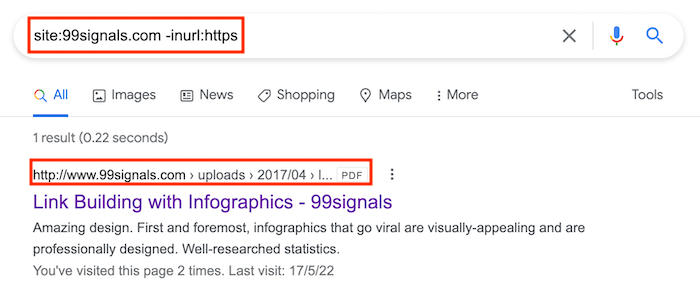
Looks like I just have 1 non-secure page — it links to an old PDF that I'm no longer offering on the site.
Let's now use this search operator for a large site like The New York Times (nytimes.com).
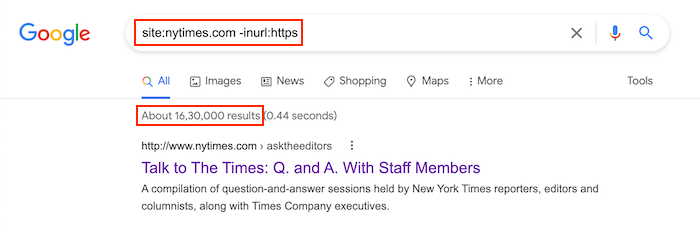
Surprisingly, The New York Times has several pages on their site that are unsecured.
Bottom line: With a "site:" search operator, you'll be able to identify non-secure pages on your website and fix them accordingly.
2. Find and Evaluate Link Building Prospects
Here's the deal: In order to rank your pages on Google, you've got to put effort into building authoritative and relevant backlinks.
Let's say you've done enough leg work to find a site that you want a link from. You can then find related sites which can be potential link building prospects.
Using the "related:" search operator, you can find similar sites:
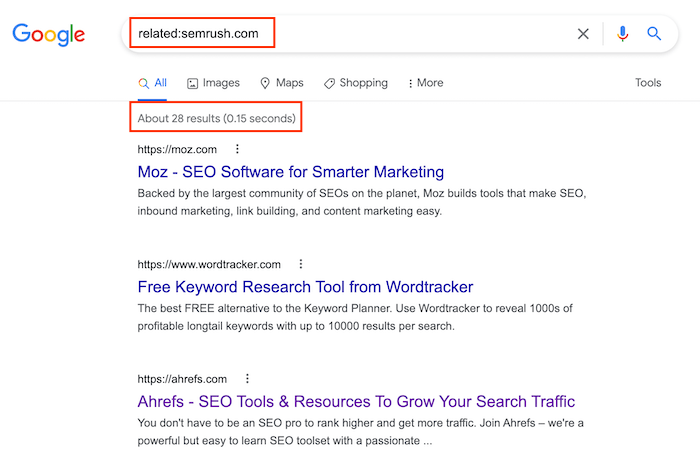
Similarly, you can use the "related:" operator to find similar pages. Let's take
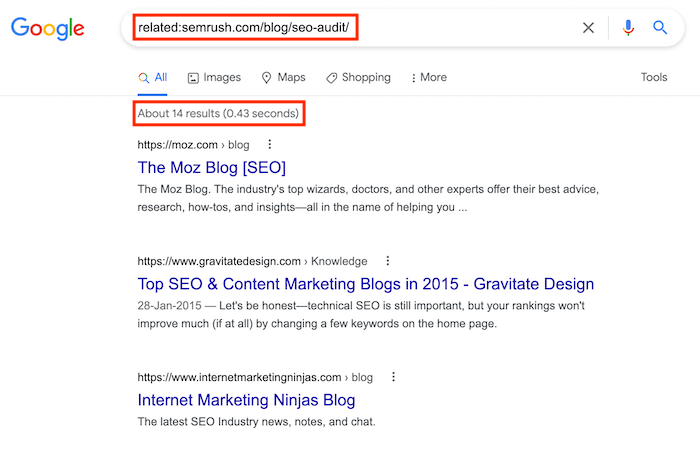
As you can see, there are 14 results that are similar.
Now, here's the catch with the "related:" search operator: Most of the sites you stumble upon will have a ton of posts and pages, and finding the most relevant page for link building purpose can be quite a challenge.
For instance, if Semrush is the site you want a link from, you'd have to sift through 190,000 pages. As you can imagine, that's a waste of your time.
In such cases, you can use the "site:" operator to find only the most relevant results from the target website.
You can do a site:domain.com "your target keywords" search to identify the posts that are most relevant to your needs.
Let's stick with
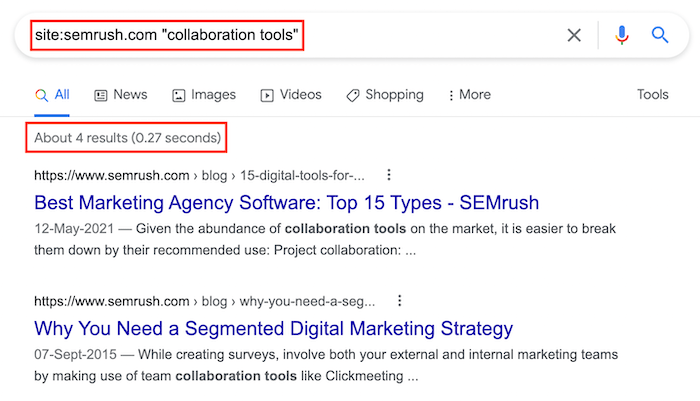
As you can see, there are currently only 4 results that contain the keywords "collaboration tools" on
3. Optimize Your Internal Linking
Internal linking is one of the best ways to pass on link authority from a top-ranking page on your site to a page that's either new or struggling to climb the SERPs.

That said, it can be a time consuming task to find relevant internal links from your site. Your time is better spent on identifying link building prospects and chasing high-quality backlinks.
This is where you can use the "site:" search operator to its best effect.
Using the "site:" operator on Google, you can find internal linking opportunities on your site and add internal links where they are relevant and most useful.
When adding internal links to existing posts, you need to make sure the links are relevant and add value to the content. Otherwise, you'll be doing more harm than good to your posts.
Let me share an example of the internal linking process I followed for one of my recent posts about SEO metrics.
In this scenario, I wanted to identify blog posts with keyword phrases similar to the topic discussed in the new post while excluding the post that I wanted to build internal links to.
This is the search operator I used:
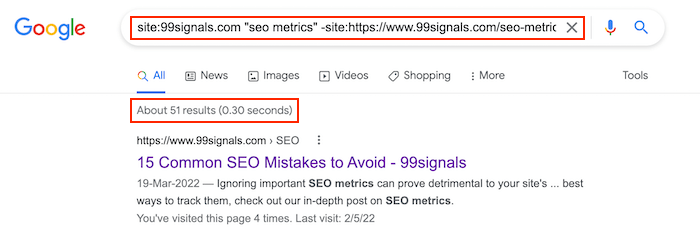
I found over 50 results from my blog. It would have been time consuming to find these posts through a manual search.
Recommended reading: Internal Links for SEO: The Definitive Guide
4. Find Indexing Errors
Indexing errors are more common than you may think.
When you use the "site:" search operator, you may find certain pages indexed that are better left unindexed. It can also be the other way round. Certain pages that should be indexed may remain non-indexed.
In each of these scenarios, you need to fix the issue as and when they occur.
Let's take the example of my own blog once again.
Using the "site:" search operator, I found that Google has indexed over 500 pages from my site.

That number is way higher than the number of blog posts and pages I have on my site.
When I dug a little deeper, I found a few pages that definitely shouldn't have been indexed. So I proceeded to delete or noindex these pages.
You can repeat a similar process for your blog and remove specific pages from SERPs by noindexing them.
In addition, if you use WordPress, you can also use these two Google search operators to identify category and tag pages that are better left nonindexed.
- site:yoursite.com/category – helps you find blog category pages;
- site:yoursite.com inurl:tag – helps you find tag pages.
5. Discover Resource Page Link Building Opportunities
Most professional bloggers have a "resource" page where they have a list of all their favorite tools, software, blog posts, books, and other resources that have helped them succeed in their blogging endeavors.
These resource pages are great link building prospects. My blog has a resource page too — a list of 75+ marketing tools which I consider essential for blogging success.

Once in a while, I get requests from other entrepreneurs and bloggers to feature their tool or software in the list. If I find the tool promising and useful, I add it to the list and the list keeps growing.
It's a win-win for both parties involved: I get to expand my list and keep my post updated and fresh at all times, and they get an authoritative backlink in return (DR: 63).
Now, if you have a useful tool or resource at your disposal, you can reach out to sites in your niche and pitch your resource for inclusion in their lists.
Here's the search operator you can use to find resource pages:

By using the "intitle:" operator, you can narrow down the results and make it easier to find potential link building prospects.
Final Thoughts
Google advanced search operators are extremely useful. When used the right way, they can save a lot of time and effort and guide you in your SEO and blogging journey.
What Google advanced search operators do you find the most useful? Are there any operator combinations that you'd like to recommend to other marketers out there? Let me know in the comments section below.
If you found this article useful, please share it on Twitter using the link below:
Editor's Note: This article was originally published on June 8, 2022 and has been updated frequently since then for freshness, accuracy, and comprehensiveness.
Related Articles









